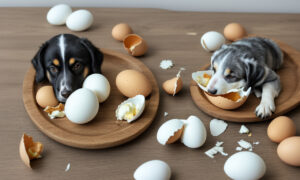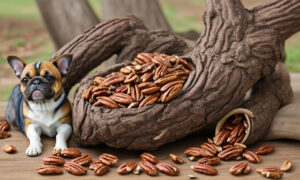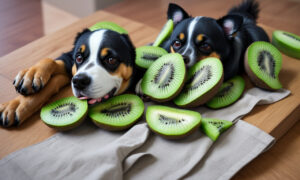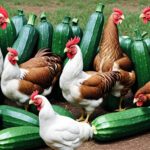As a dedicated dog owner, you scrutinize every morsel that enters your furry friend’s mouth, ensuring it contributes to their health and happiness. In your quest for snack variety, a common question might prickle your curiosity: Can a dog eat Twizzlers? This twisted confection has been a staple in candy aisles worldwide, but does it belong in a dog’s diet? Let’s unwrap the truth about indulging your pup’s sweet tooth with these licorice treats.
Understanding pet nutrition and the human snacks that cross the line into your dog’s bowl is essential. However, it’s crucial to investigate the ingredients, nutritional value, and potential health risks beyond the colorful packaging of Twizzlers. In this comprehensive guide, we explore the compatibility of Twizzlers with a dog’s dietary needs, aiming to provide pet owners with the knowledge to make informed snack choices for their canine companions.
The Components of Twizzlers: A Close Look at Ingredients
Before we dive into the big question, it’s important to understand what Twizzlers are made of. Widely known as a licorice-type candy, they are a mixture of ingredients, some of which may not be suitable for your four-legged friend.
Understanding the Ingredient List
Twizzlers typically contain the following ingredients:
- Corn syrup: A common sweetener in human food that is high in sugar.
- Enriched wheat flour: Offers minimal nutritional value for dogs and poses a risk for those with gluten sensitivities.
- Sugar: Excessive sugar can lead to obesity and dental problems in canines.
- Palm oil: While not toxic, it is high in fat, which can be hard on a dog’s digestion.
- Salt: Dogs need some sodium in their diet, but too much can be harmful.
- Glyceryl monostearate: An emulsifier that is generally recognized as safe but unnecessary for a dog’s diet.
- Cornstarch: A filler with little nutritional benefit.
- Glycerin: Often used to maintain chewiness but adds no nutritional value.
- Natural and artificial flavor: These are undisclosed and could contain compounds not recommended for dogs.
- Citric acid: Commonly used for flavor but often irrelevant for dogs.
- Potassium sorbate: A preservative that could potentially cause allergies.
- Artificial color: Including Red 40, which has been the subject of some health concerns for humans and animals alike.
Analysis of Ingredients and Possible Health Implications
Ingesting corn syrup and sugar can contribute to a range of problems including weight gain, diabetes, and dental decay in dogs. Enriched wheat flour is not inherently toxic but could trigger allergies or digestive issues. The palm oil content raises concerns due to its high fat, which can lead to pancreatitis in dogs if consumed in large quantities. Salt must be closely monitored as an excessive amount is detrimental to canine health. Artificial colors and flavors are often unnecessary and could cause allergic reactions or long-term health issues.
Are Twizzlers Safe for Dogs? Assessing the Risks
It’s time to address the crux of our inquiry: are Twizzlers safe for canine consumption? The truth is, while Twizzlers aren’t regarded as immediately toxic to dogs, they offer no health benefits and carry several risks.
Potential Health Concerns with Twizzlers and Dogs
When considering whether you can share your candy with your canine, think about these potential health concerns:
- Obesity: The high sugar and fat content in Twizzlers can contribute to unhealthy weight gain.
- Dental problems: Sugar is the enemy of dental health, potentially leading to cavities and other dental issues.
- Digestive issues: Dogs may experience upset stomach, diarrhea, or vomiting after ingesting high-sugar or high-fat foods like Twizzlers.
- Artificial ingredients sensitivity: Some dogs may have an adverse reaction to artificial colors and flavors, leading to allergies or intolerances.
The Reality of a ‘No’ Answer
Considering the health concerns, the safest course is to avoid giving Twizzlers to your dog. With no nutritional benefits and several potential risks, these treats are more of a danger than a delight for your pup’s health.
Healthy Alternatives to Twizzlers for Canine Snacks
Since Twizzlers are not a recommended treat for your dog, exploring healthy alternatives that can satisfy their sweet tooth without the risks is essential. Here are some nutritious snack ideas that are much more suitable for your canine friend:
- Carrots: Crunchy and sweet, carrots are a great low-calorie option.
- Apples (excluding seeds): Apples are another sweet treat, just make sure to remove the seeds and core.
- Blueberries: These berries are a superfood, rich in antioxidants.
- Watermelon (seedless): A hydrating and sweet summer snack, minus the seeds.
- Sweet potatoes: Baked or dehydrated, sweet potatoes make a chewy, tasty treat.
Introducing Healthy Snacks to Your Dog
When incorporating new snacks into your dog’s diet, consider these tips:
- Start small: Introduce new treats gradually and in small quantities to prevent digestive upset.
- Avoid added sugars: Always choose natural and fresh options without added sugars or fats.
- Consult with a vet: Talk to your veterinarian before making significant changes to your dog’s diet, especially if they have health issues.
Conclusion: Prioritizing Your Dog’s Health with Appropriate Snacks
In conclusion, while Twizzlers are a human candy favorite, they should not be part of your dog’s snack regimen. The high sugar content, artificial ingredients, and lack of nutritional value make Twizzlers an unsuitable, and potentially harmful, treat for canines. Instead, prioritize your dog’s health by choosing natural, nutritious snacks that will not only satisfy their taste buds but also contribute to their overall well-being.
Remember, as a responsible pet owner, always be vigilant about what you feed your canine companion. Your dog relies on you for their health and happiness, and appropriate snacks are a pivotal part of a balanced lifestyle. By making the right choices when it comes to treats, you can ensure your pup stays healthy, happy, and by your side for many years to come.







